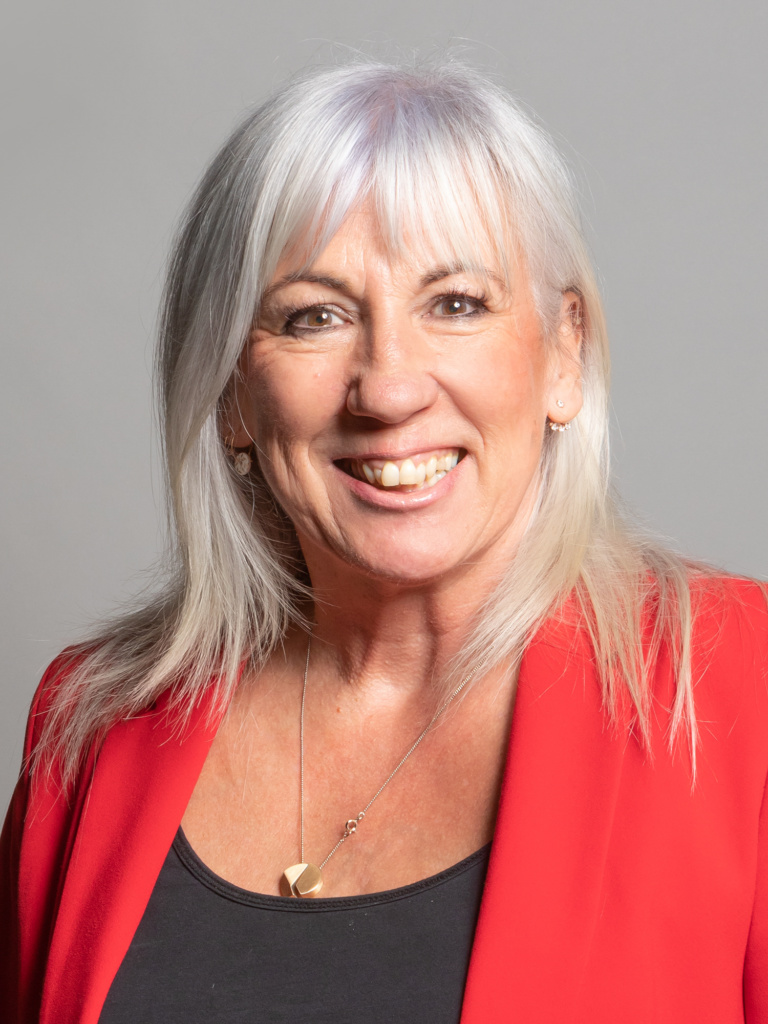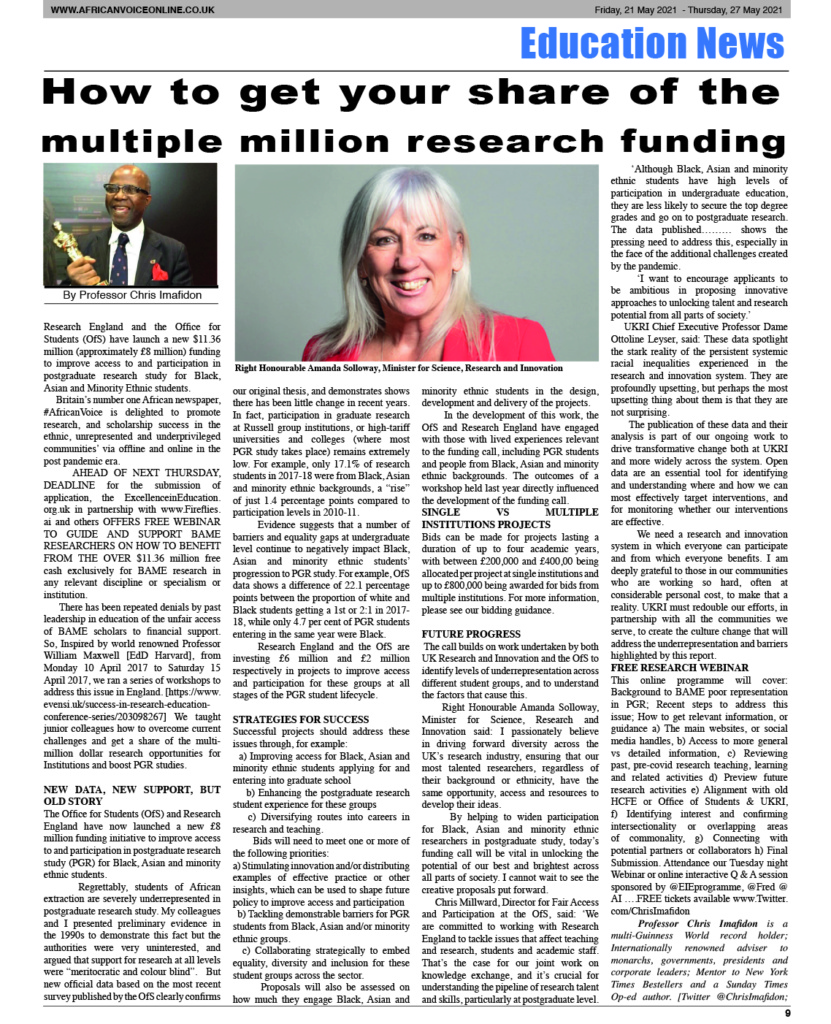
[FIVE SIMPLE STEPS FOR ANY BAME RESEARCHER TO GET FREE OVER $11.36 Million MONEY]
Research England and the Office for Students (OfS) have launched a new $11.36 million (approximately £8 million) funding to improve access and participation in postgraduate research study for Black, Asian and Minority Ethnic students.
By Professor Chris Imafidon – Britain’s number one African newspaper, #AfricanVoice is delighted to promote research, and scholarship success in the ethnic, unrepresented and underprivileged communities’ via offline and online sessions in the post pandemic era.
AHEAD OF NEXT THURSDAY, DEADLINE for the submission of application, the ExcellenceinEducation.org.uk in partnership with www.Fireflies.ai and others OFFER FREE WEBINAR TO GUIDE AND SUPPORT BAME RESEARCHERS ON HOW TO BENEFIT FROM THE OVER $11.36 million free cash exclusively for BAME research in any relevant discipline or specialism or institution.
Professor Chris Imafidon – There has been repeated denials by past leadership in education of the restricted access of BAME scholars to opportunity and financial support. So, Inspired by world renowned Professor William Maxwell [EdD Harvard], from Monday 10 April 2017 to Saturday 15 April 2017, we have since run a series of workshops to address this issue in England.
We taught junior colleagues how to overcome current challenges and get a share of the blatantly denied multi-million dollar research opportunities for Institutions and boost PGR studies.
NEW DATA, NEW SUPPORT, BUT OLD STORY
The Office for Students (OfS) and Research England have now launched a £8 million funding initiative to improve access and participation in postgraduate research study (PGR) for Black, Asian and minority ethnic students. Based on past denied opportunities of the BAME community….We hope that this will be used as an opportunity to compensate those who were once denied and recoup the decades of injustice.
Regrettably, students of African extraction are severely underrepresented in postgraduate research study. My colleagues and I presented preliminary evidence in the 1990s to demonstrate this fact but the authorities were very uninterested, and argued that support for research at all levels were “meritocratic and colour blind”. But new official data based on the most recent survey published by the OfS clearly confirms our original thesis, and demonstrates that there has been little change in recent years. In fact, participation in graduate research at Russell group institutions, or high-tariff universities and colleges remains disgracefully low. For example, only 17.1% of research students in 2017-18 were from Black, Asian and minority ethnic backgrounds, a “rise” of just 1.4 percentage points compared to participation levels in 2010-11.
Evidence suggests that a number of barriers and equality gaps at undergraduate level continue to negatively impact Black, Asian and minority ethnic students’ progression to PGR study. For example, OfS data shows a difference of 22.1 percentage points between the proportion of white and Black students getting a 1st or 2:1 in 2017-18, while only 4.7 per cent of PGR students entering in the same year were Black.
Research England and the OfS are investing £6 million and £2 million respectively in projects to address blatant historically injustice for these groups at all stages.
STRATEGIES FOR SUCCESS
Successful projects should address these issues through, for example:
a) Improving access for Black, Asian and minority ethnic students applying for and entering into graduate school
b) Enhancing the postgraduate research student experience for these groups
c) Diversifying routes into careers in research and teaching.
Bids will need to meet one or more of the following priorities:
a) Stimulating innovation and/or distributing examples of effective practice or other insights, which can be used to shape future policy to improve access and participation
b) Tackling demonstrable barriers for PGR students from Black, Asian and/or minority ethnic groups.
c) Collaborating strategically to embed equality, diversity and inclusion for these student groups across the sector.
Proposals will also be assessed on engagement levels of Black, Asian and minority ethnic students in the design, development and delivery of the projects.
In the development of this work, the OfS and Research England tried to engaged those with lived experiences relevant to the funding call, including PGR students and people from Black, Asian and minority ethnic backgrounds. The outcomes of a workshop held last year should have influenced the development of the funding call.
SINGLE VS MULTIPLE INSTITUTIONS PROJECTS
Initial information show that research bids can be made for projects lasting up to four academic years, with between £200,000 and £400,00 being allocated per project at single institutions and up to £800,000 being awarded for bids from multiple institutions. Experienced BAME researchers believe that this too little too late and that the amount should increase and individual and institutions with no prior grant success must be prioritised.
FUTURE PROGRESS
The call builds on work undertaken by both UK Research and Innovation and the OfS to identify levels of underrepresentation, black non representation, across different student groups, and to understand the factors that cause this.
Ms Amanda Solloway, Minister for Science, Research and Innovation said: I passionately believe in driving forward diversity across the UK’s research industry, ensuring that our most talented researchers, regardless of their background or ethnicity, have the same opportunity, access and resources to develop their ideas.
By helping to widen participation for Black, Asian and minority ethnic researchers in postgraduate study, …call will be vital in unlocking the potential of our best and brightest across all parts of society. I cannot wait to see the creative proposals put forward.
Chris Millward, Director for Fair Access and Participation at the OfS, said: ‘We are committed to working with Research England to tackle issues that affect teaching and research, students and academic staff. That’s the case for our joint work on knowledge exchange, and it’s crucial for understanding the pipeline of research talent and skills, particularly at postgraduate level.
‘Although Black, Asian and minority ethnic students have high levels of participation in undergraduate education, they are less likely to secure the top degree grades and go on to postgraduate research. The data published……… shows the pressing need to address this, especially in the face of the additional challenges created by the pandemic.
‘I want to encourage applicants to be ambitious in proposing innovative approaches to unlocking talent and research potential from all parts of society.’
UKRI Chief Executive Professor Dame Ottoline Leyser, said: These data spotlight the stark reality of the persistent systemic racial inequalities experienced in the research and innovation system. They are profoundly upsetting, but perhaps the most upsetting thing about them is that they are not surprising.
The publication of these data and their analysis is part of our ongoing work to drive transformative change both at UKRI and more widely across the system. Open data are an essential tool for identifying and understanding where and how we can most effectively target interventions, and for monitoring whether our interventions are effective.
We need a research and innovation system in which everyone can participate and from which everyone benefits. I am deeply grateful to those in our communities who are working so hard, often at considerable personal cost, to make that a reality. UKRI must redouble our efforts, in partnership with all the communities we serve, to create the culture change that will address the underrepresentation and barriers highlighted by this report.
FREE RESEARCH WEBINAR – FIVE STEPS TO RESEARCH SUCCESS
As our contribution to equity in research we will be running offline and online sessions and seminars to support BAME. This week’s webinar is one of the first. This week’s online programme will cover: Background to BAME poor representation in PGR; Recent steps to address this issue; How to get relevant information, or guidance a) The main websites, or social media handles, b) Access to more general vs detailed information, c) Reviewing past, pre-covid research teaching, learning and related activities d) Preview future research activities e) Alignment with old HEFCE or Office of Students & UKRI, f) Identifying interest and confirming intersectionality or overlapping areas of commonality, g) Connecting with potential partners or collaborators. Attend our Tuesday night Webinar https://bit.ly/3hOhuPj or online interactive Q & A session sponsored by @EIEprogramme, @Fireflies.ai, @AfricanVoice…. FREE tickets available www.Twitter.com/ChrisImafidon
Professor Chris Imafidon’s research has been recognised internationally, winning multiple awards in many continents across multiple disciplines and his mentees are global leaders in pioneering research. He is a multi-Guinness World record holder; Internationally renowned adviser to monarchs, governments, presidents and corporate leaders; Mentor to New York Times Bestellers and a Sunday Times Op-ed author. [Twitter @ChrisImafidon; Instagram @CoImafidon; Facebook/Linkedln –Professor Chris Imafidon]
Kindly follow us on twitter:@AfricanVoice2










